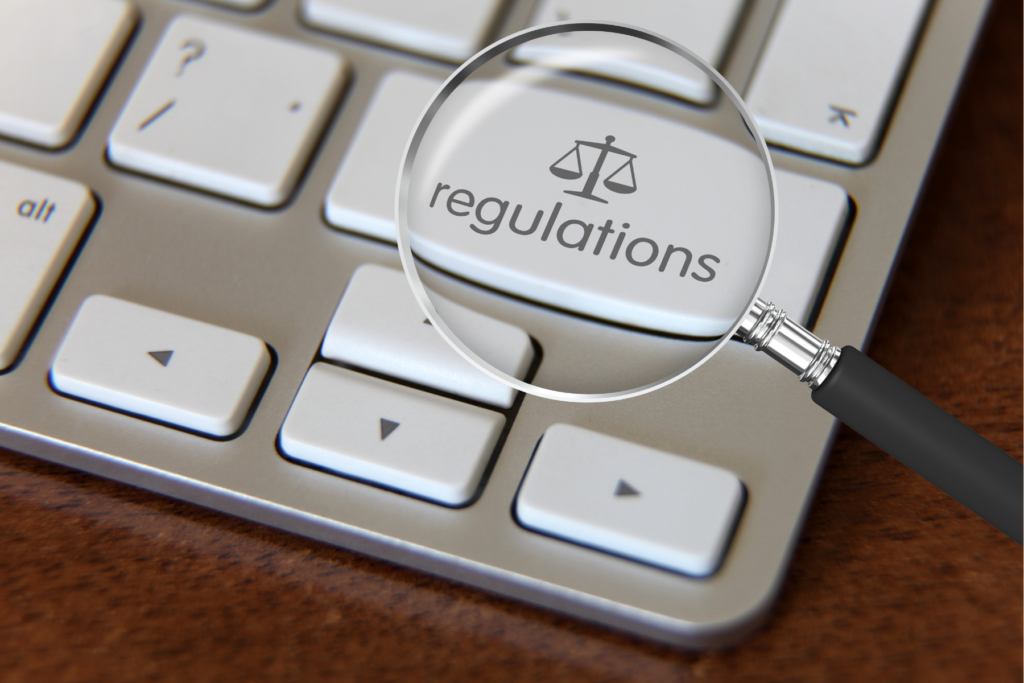
Website rules and regulations are a document that sets out the rules for the use of the website and the responsibilities of both parties - the owner and the users. When creating the terms and conditions, you need to consider both the law and the specifics of your business. Below is a list of key elements that should be included in the website rules and regulations.
What must website regulations have?
1. general information.
2. Rules for registration and use of the account.
3 User responsibilities.
4 Content liability rules.
5 Rules for amending the rules.
6. Data protection and privacy policy.
7 Information on cookies.
8 Final provisions.
What should a website's terms and conditions contain? - Checklist
- Name and contact details of the site owner (e.g. company, address, e-mail).
- Definitions of key terms used in the Terms and Conditions (e.g. "User", "Account").
- Technical requirements necessary to use the website (e.g. Internet access, browser compatibility).
- Prohibition of unlawful content (e.g. illegal, offensive content).
- Registration and login process.
- User responsibilities in connection with the use of the account (e.g. protection of login data).
- Conditions for closure or deletion of an account by the user or the site owner.
- Information on the processing of personal data in accordance with the RODO.
- Purpose, scope and legal basis of data processing.
- Users' rights in relation to data processing (right of access, rectification, erasure, etc.).
- Information on the possibility of amending the rules and the procedure for notifying such amendments.
- How cookies work on the website and the purposes of their use.
- Possibility for the user to manage cookies (e.g. via browser settings).
- Rules regarding the responsibility of the site owner for the content posted by users.
- Limitations on the site owner's liability for damages arising from the use of the site.
What must an online shop's terms and conditions have?
1. general information.
2 Types and scope of services provided.
3 Conditions for the provision of electronic services.
4 Rules for registration and use of the account.
5 User responsibilities.
6 Content liability rules.
7 Rules for amending the rules.
8 Procedure for reporting problems.
9 Ordering and payment rules.
10. Returns and complaints policy.
11 Conditions for the conclusion and termination of contracts.
12 Complaint procedure.
13. Data protection and privacy policy.
14 Information on cookies.
15 Liability clauses.
16 Final provisions.
The following information is usually included in the final provisions section:
In matters not covered by these Terms and Conditions, the provisions of Polish law, in particular the Civil Code and the provisions of the Act on Special Terms of Consumer Sales and Amendments to the Civil Code of 18 July 2002 (Journal of Laws 2001 No. 144 item 1204) the provisions of the Consumer Rights Act of 30 May 2014 shall apply. (Journal of Laws 2014, item 827 as amended); and other relevant provisions of generally applicable law.
What should an online shop's terms and conditions contain? - Checklist
- Name and contact details of the site owner (e.g. company, address, e-mail).
- Definitions of key terms used in the terms and conditions (e.g. "User", "Services", "Account").
- Description of the services offered by the site (e.g. user account management, product sales, newsletters).
- Information on whether the use of services is charged or free of charge.
- Technical requirements necessary to use the website (e.g. Internet access, browser compatibility).
- Prohibition of unlawful content (e.g. illegal, offensive content).
- Registration and login process.
- User responsibilities in connection with the use of the account (e.g. protection of login data).
- Conditions for closure or deletion of an account by the user or the site owner.
- Ordering procedure.
- Payment methods available on the website.
- Information on delivery costs and order processing conditions.
- Conditions and deadlines for withdrawal (right of withdrawal within 14 days for consumers).
- Procedure for submitting and dealing with complaints.
- Information when the service contract is concluded (e.g. after the user accepts the terms and conditions).
- Terms and conditions of termination by the user or owner of the site.
- Information on how users can report service issues.
- Deadlines for responding to complaints and how to handle them.
- Information on the processing of personal data in accordance with the RODO.
- Purpose, scope and legal basis of data processing.
- Users' rights in relation to data processing (right of access, rectification, erasure, etc.).
- Description of how users can report service issues.
- Information on the possibility of amending the rules and the procedure for notifying such amendments.
- Provisions on applicable law (e.g. which law will apply in the event of disputes).
- Dispute resolution rules (e.g. possibility of amicable settlement of disputes, jurisdiction of courts).
- How cookies work on the website and the purposes of their use.
- Possibility for the user to manage cookies (e.g. via browser settings).
- Rules regarding the responsibility of the site owner for the content posted by users.
- Limitations on the site owner's liability for damages arising from the use of the site.
Why are website regulations important?
The regulations on the website are crucial for several reasons. First of all, it is a legal requirement, which ensures compliance with regulations for the provision of online services and protects against potential penalties. Secondly, the terms and conditions offer protection to the entrepreneur by defining the rules of use, payment and complaint procedures, which helps avoid disputes with users. In addition, it also facilitates conflict resolution through precisely defined complaints procedures.
Website terms and conditions differ from online shop terms and conditions primarily in scope. The website terms and conditions establish the general rules for the use of the website, the privacy policy and the rules for the publication of content. In contrast, the terms and conditions of the online shop focus on details related to online commerce, such as terms and conditions of purchase, forms of payment, cancellation procedures and rules for complaints. Both documents are important, but the shop rules require more detailed regulation of commercial issues.
Unauthorised clauses - webshop regulations
The prohibited clauses in the terms and conditions of the online shop are available at the link provided: www.rejestr.uokik.gov.pl
List of examples of prohibited clauses
-
- "The cost of delivery and return of the product is not reimbursed by the shop".
-
- "The shop reserves the right to refuse orders that are questionable".
-
- "A claim for reimbursement of the advance payment is excluded except as otherwise provided in the T&Cs and the DOWU."
-
- "Differences between the actual appearance of the product and its picture on the website cannot be the basis for a complaint and return of the purchased goods."
-
- "The shop owner reserves the right to change the content of the terms and conditions without notifying users."
Summary
Website regulations are not only a legal requirement, but also an important tool to protect the interests of both the website owner and its users. Well-constructed rules of procedure should be clear, understandable and in line with current legislation, particularly in the context of consumer protection and the protection of personal data.

 4 minutes reading
4 minutes reading


